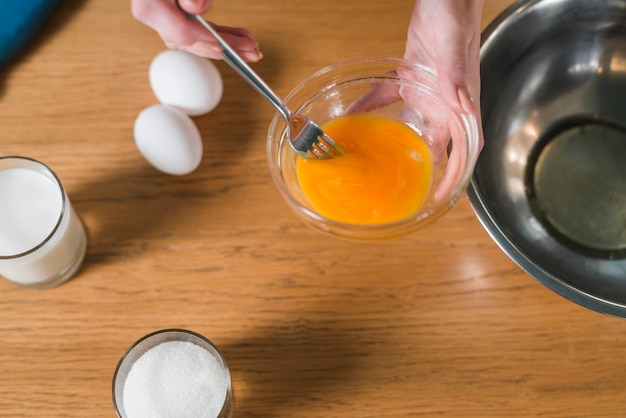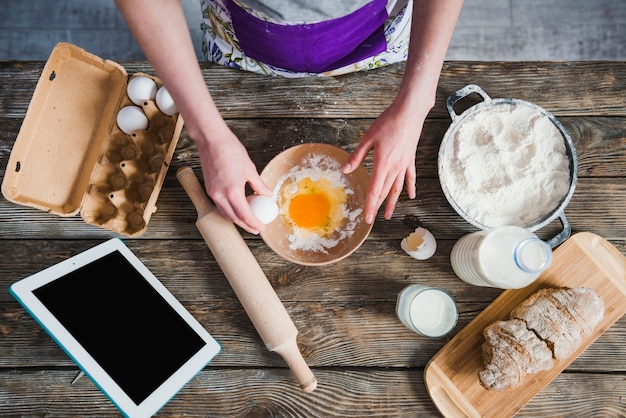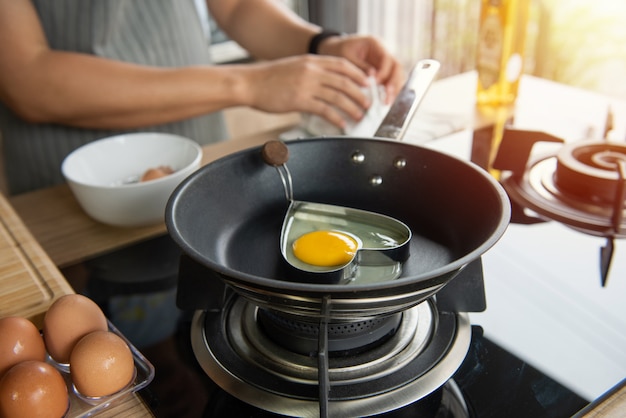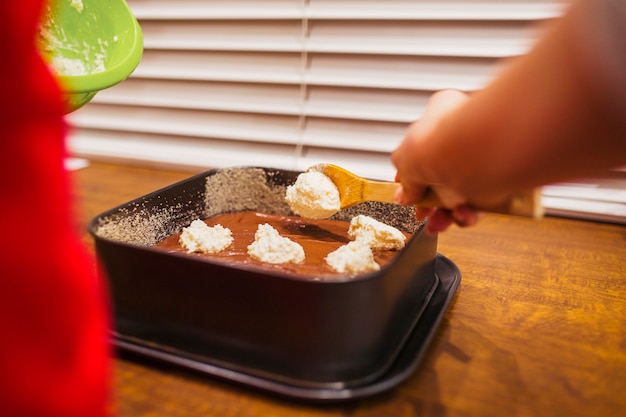(Part 1) The Basics: Getting Started

The first thing you need to understand is that there's no one-size-fits-all answer to the question of how long to boil an egg. The perfect time depends on the size of the egg, the temperature of the water, and your desired texture. But don't worry, we'll break it all down.
choosing the right eggs
First things first, you need the right eggs. I generally use large eggs for boiling, as they tend to be more consistent in size and cook evenly. If you're working with smaller or extra-large eggs, adjust the cooking time accordingly. When it comes to eggs, fresher is always better. The older the egg, the more likely it is to have a larger air pocket, which can lead to cracking during boiling.
The Importance of Cold Water
You'll often hear people saying to start with cold water when boiling eggs. That's crucial! Cold water allows the eggs to heat up gradually, preventing cracking. Think of it as a gentle warming up rather than a sudden shock. If you start with hot water, the temperature difference between the inside and outside of the egg can cause the shell to crack.
Adding Salt to the Water
Some people swear by adding salt to the water, claiming it helps prevent cracking and adds flavour to the eggs. I've tried both ways, and I can't say I've noticed a huge difference. It's really up to you. The salt, if any, is not going to penetrate the shell. However, if you're feeling like a pinch of salt will make your eggs a bit more fancy, go for it!
The Importance of a Timer
You might think it's obvious, but it's crucial to have a timer handy. It's easy to lose track of time when you're busy in the kitchen. A timer ensures that you don't overcook your eggs, which can lead to a rubbery texture.
(Part 2) The egg texture Chart

Okay, so we're all set. Now, let's talk about those textures. The perfect boiled egg is all about finding that sweet spot, where the yolk is just cooked through but still silky smooth, and the white is firm but not rubbery. I've created this table to help you understand the different cooking times and what to expect:
| Texture | Cooking Time (Minutes) | Yolk | White |
|---|---|---|---|
| Soft Boiled | 3-4 minutes | Very runny, almost liquid | Very tender, almost translucent |
| Medium Boiled | 6-7 minutes | Soft, slightly runny | Set, but still tender |
| Hard Boiled | 8-10 minutes | Firm, but still creamy | Firm, slightly rubbery |
| Very Hard Boiled | 12 minutes | Hard, rubbery | Very firm, rubbery |
Remember, these are just guidelines. The actual cooking time might need to be adjusted depending on your specific eggs and preferences. But this chart should give you a good starting point.
(Part 3) The Secret to Perfectly Cooked Yolk

Now, let's talk about the heart of the boiled egg – the yolk. It's the star of the show, isn't it? And getting the yolk just right is key to a truly satisfying experience. Personally, I prefer a slightly runny yolk. It's rich, creamy, and adds a luxurious touch to my eggs. But I know many people prefer a firm yolk.
The Importance of Gentle Boiling
To achieve that perfect yolk, gentle boiling is crucial. A gentle simmer rather than a full-on boil will ensure the yolk cooks evenly without becoming hard and rubbery. Just keep the water bubbling gently, not raging like a volcano. A vigorous boil can cause the eggs to shake around in the pan, leading to cracking and uneven cooking.
The Cooling Trick
Once your eggs are cooked, I've found that shocking them in an ice bath stops the cooking process immediately and helps create a smoother, more velvety yolk. This might seem a little dramatic, but it's a real game-changer. Just plunge them into a bowl of ice water for a few minutes. Trust me, your eggs will thank you. The ice bath also makes the eggs easier to peel as the sudden temperature change helps loosen the shell from the white.
(Part 4) Mastering the Perfect hard boiled egg
Let's be honest, sometimes you just want a hard-boiled egg, no ifs, ands, or buts. It's a staple for sandwiches, salads, and even deviled eggs. But achieving that perfect hard-boiled egg can be a bit trickier. You don't want it to be rubbery or overly dry, but you want that yolk to be firm and not runny.
The Secret to a Firm, Yet Creamy Yolk
The key is to boil for just the right amount of time. As I mentioned earlier, 8-10 minutes is usually the sweet spot. But you might find you need to adjust the time depending on your eggs.
Preventing the green ring
Now, let's address the dreaded green ring that sometimes forms around the yolk of hard-boiled eggs. This happens when the egg is overcooked, and the iron in the yolk reacts with the sulfur in the white. It doesn't affect the taste, but it's not exactly aesthetically pleasing.
- Avoid Overcooking: Sticking to the recommended cooking times is crucial.
- Add Vinegar: Some people say adding a tablespoon of vinegar to the water helps prevent the green ring. I've tried it, and it seems to work, but I wouldn't say it's a must-have. The vinegar is thought to help stabilize the egg whites, preventing them from reacting with the iron in the yolk.
- Cool Quickly: As we discussed earlier, an ice bath stops the cooking process and prevents the green ring from forming. The rapid cooling prevents further chemical reactions between the iron and sulfur.
(Part 5) Beyond the Basics: Other Tips and Tricks
Now, let's talk about some of my favourite tips and tricks that have made all the difference in my boiled egg journey. These little hacks can take your eggs to the next level.
Adding Baking Soda to the Water
I've heard some people say that adding baking soda to the water makes the egg whites easier to peel. I'm not convinced this actually works, but I've tried it, and it doesn't seem to do any harm. So, if you're feeling adventurous, give it a go. It's thought that baking soda helps loosen the shell, but I haven't found it to be a significant improvement.
Using a Spoon to Crack the Shell
This is a little trick I learned from my grandmother, and it's truly a game-changer. Instead of cracking the egg directly on a hard surface, gently tap it with the back of a spoon. This creates a small crack that's much easier to peel off. Cracking the shell with a spoon prevents the shell from shattering into smaller pieces that can be more difficult to remove.
Peeling Under Cold Water
And finally, let's talk about peeling. One of the biggest joys of a boiled egg is that beautiful, smooth surface. To make peeling a breeze, run the egg under cold water while you peel. The water helps loosen the shell, and it makes the process so much easier. It's like magic.
(Part 6) The Art of Deviled Eggs
Let's be honest, a perfect boiled egg is a joy in itself, but sometimes you want to take things up a notch. Deviled eggs are the epitome of this – a little bit of effort, a lot of deliciousness. The creamy yolk, the tangy dressing, the crunchy garnish – it's a symphony of flavours and textures.
The Essentials for Deviled Eggs
To make the perfect deviled eggs, you need a few key ingredients:
- Hard-Boiled Eggs: Of course, you need those perfectly cooked eggs.
- Mayonnaise: This is the base of your creamy filling.
- Mustard: A touch of mustard adds a tangy kick to the filling.
- Salt and Pepper: These are essential for seasoning.
- Garnish: Paprika, chopped chives, or even a sprinkle of bacon are great options for adding a finishing touch.
My Favourite Deviled Egg Recipe
I've been perfecting my deviled egg recipe for years, and here's what I've come to love:
- Boil 6 eggs: I like to use a half dozen eggs for a good amount of deviled egg goodness.
- Chop the yolks: Once the eggs are cool enough to handle, carefully cut them in half and scoop out the yolks.
- Mash the yolks: In a bowl, use a fork to mash the yolks until they are smooth.
- Add the dressing: Add 2 tablespoons of mayonnaise, 1 teaspoon of Dijon mustard, a pinch of salt, and a few grinds of black pepper.
- Mix well: Mix everything together until it's smooth and creamy.
- Fill the egg whites: Carefully spoon the filling back into the egg whites.
- Garnish: Sprinkle with paprika or chopped chives.
The Joy of Deviled Eggs
There's something special about deviled eggs, isn't there? They're perfect for parties, picnics, and even just a quick snack. They're a bit of a culinary masterpiece, a testament to the versatility of the humble egg.
(Part 7) The World of Boiled Eggs: Beyond the Basics
Now that we've explored the basics of boiling eggs and the joys of deviled eggs, let's venture beyond the ordinary. There's a whole world of boiled egg possibilities waiting to be discovered.
Boiled Eggs in Salads
Boiled eggs are a classic salad ingredient. They add texture, protein, and a delightful creamy touch. They’re perfect in everything from potato salad to egg salad to a simple green salad.
Boiled Eggs in Soups
Who doesn't love a hearty soup with a perfectly cooked boiled egg floating on top? It's like a little treasure you uncover as you spoon up your soup. Eggs add a richness and a satisfying heartiness to soups.
Boiled Eggs in Sandwiches
From classic egg salad sandwiches to a simple boiled egg on toast, boiled eggs are a delicious and versatile sandwich ingredient. They add protein, flavour, and a satisfying texture to any sandwich.
Boiled Eggs as a Healthy Snack
Boiled eggs are a fantastic option for a healthy and satisfying snack. They're packed with protein, vitamins, and minerals, and they can keep you feeling full for longer.
Boiled Eggs in Asian Cuisine
Boiled eggs play a significant role in many Asian cuisines. They're often used in dishes like ramen, pho, and congee. In some Asian cultures, boiled eggs are also used in traditional celebrations and festivals.
Boiled Eggs in Vegetarian and Vegan Diets
Boiled eggs can be a valuable source of protein for vegetarians and vegans. They're a great addition to plant-based meals, providing essential nutrients and a satisfying texture.
(Part 8) FAQs: Your Boiled Egg Questions Answered
Let's clear up some of those frequently asked questions that often pop up when it comes to boiling eggs.
1. What if my eggs crack during boiling?
Don't worry, it happens to the best of us. Cracking can sometimes occur, but it usually doesn't affect the taste of the egg. Just make sure the crack is small, and the egg white doesn't leak out. If you're concerned, you can add a teaspoon of vinegar to the water, which might help prevent further cracking. The vinegar is thought to help stabilize the egg whites, preventing them from leaking out through cracks.
2. How do I make sure my eggs peel easily?
As mentioned earlier, starting with cold water and using a spoon to crack the shell can make peeling much easier. Additionally, cooling the eggs quickly in an ice bath can also help prevent the shell from sticking. And lastly, peeling under cold water is a little trick that really works!
3. Can I reheat boiled eggs?
Yes, you can reheat boiled eggs. But be careful not to overcook them. You can reheat them in the microwave or in a pan of simmering water. Just watch them closely and remove them from the heat when they're warm enough to eat.
4. How long can I store boiled eggs in the refrigerator?
Boiled eggs can be stored in the refrigerator for up to a week. Just make sure you keep them in a container with a lid or wrap them tightly in plastic wrap.
5. What if my eggs have a green ring?
While the green ring might not be the prettiest sight, it doesn't affect the taste or safety of the egg. It's simply a result of overcooking. You can eat them without any worries.
(Part 9) The Joy of a Simple Boiled Egg
Let's not forget the simple joy of a boiled egg. It's a perfect snack, a satisfying breakfast, and a versatile ingredient. From the runny yolk of a soft-boiled egg to the creamy texture of a medium-boiled egg to the firmness of a hard-boiled egg, there's a boiled egg texture for every taste.
So, go forth and boil some eggs. Experiment with different cooking times, try out the tips and tricks I've shared, and discover the world of boiled eggs. It's a delicious journey, and I guarantee you'll find something you love.
Everyone is watching

How to Cook Frozen Lobster Tails Perfectly: A Step-by-Step Guide
RecipesLobster. Just the word conjures up images of lavish meals, special occasions, and a taste of luxury. But let's...

Pork Fillet Cooking Time: How Long to Cook It Perfectly
RecipesPork fillet, or tenderloin as it's sometimes called, is a real favourite in our house. It's so versatile, and...

Pigs in a Blanket Cooking Time: How Long to Bake for Perfect Results
RecipesAh, pigs in a blanket. Just the name conjures up images of those delightful little parcels of crispy pastry en...

The Ultimate Guide to Cooking Delicious Frankfurters
RecipesLet's face it, we all love a good frankfurter. It's a classic, simple, and always satisfying. But let's be rea...

Wolf Meat Recipes: A Guide to Cooking Wild Game
RecipesLet's be honest, you don't see wolf meat at your local butcher shop every day. It's a bit of a wild card, but ...
